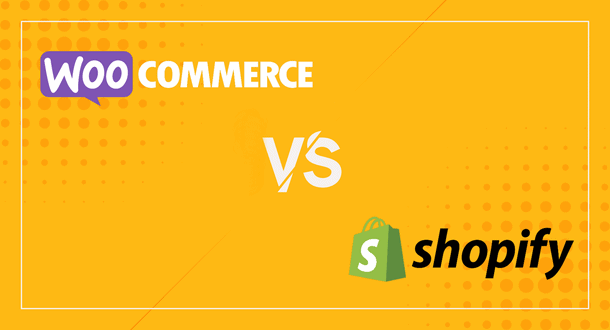

As the e-commerce landscape continues to evolve, choosing the right platform for your online store gets even more crucial.
WooCommerce and Shopify are two of the most popular and robust e-commerce platforms available. Each offers unique features and benefits.
In this blog, we will discuss WooCommerce vs Shopify which is better. We will examine their strengths, weaknesses, and what makes them stand out in the competitive e-commerce market. Let’s begin.
Quick Comparison Between WooCommerce vs Shopify
| Sr no. | Feature | WooCommerce | Shopify |
|---|---|---|---|
| 1 | Pricing | Transaction-based, no monthly fees. Hosting and domain costs vary. | Starts at $29/month (paid annually) for Basic Shopify. Higher-tier plans available. |
| 2 | Ease of use | User-friendly with an intuitive interface. | User-friendly with an intuitive interface. |
| 3 | Customization | Highly customizable, but may require developer expertise. | Less customizable out of the box, but easier for non-technical users. |
| 4 | Reporting and Analytics | Offers basic reporting; advanced plugins for analytics. | Robust built-in analytics and reporting tools. |
| 5 | Scalability | Scalable, but performance may vary based on hosting and plugins. | Excellent scalability with reliable performance. |
| 6 | Security | Security depends on hosting and the plugins used. | Strong security features, including SSL certificates. |
| 7 | Marketing | Requires additional plugins for advanced marketing features. | Built-in marketing tools, including SEO features. |
| 8 | Performance | Performance varies based on hosting and optimization. | Consistently high performance with reliable uptime. |
| 9 | Support | Support is available through forums and tickets. | Comprehensive support options, including live chat and phone support. |
1. Pricing
Pricing matters because you need to have proper planning before choosing a platform to host your website. All things are considered like hosting, support quality, features, etc.

WooCommerce:
You can create your e-commerce website on WooCommerce for free. The cost comes in when you want to customize your website, get custom functionalities, and build custom plugins and themes. You cannot do these on your own. Here you have to opt for custom WooCommerce development services.
Shopify:
In Shopify, you need to pay firsthand for the Shopify plugin. You get 4 different pricing options. Where the basic one starts from $23.9 monthly. And Later on when you scale your Shopify store you need to spend more money on scalability.
Comparing Shopify payments, WooCommerce easily wins in this case. You only need to pay for what you need. Also you can choose to get free plugins and themes. These could save your expenses.Whereas in Shopify, you need to pay for every functionality and additional resources.
2. Ease of Use
Ease of use is crucial because when a beginner uses the e-commerce platform, they should find it easy to work with rather than avoiding it due to its complexity.

WooCommerce:
WooCommerce offers you a drag-and-drop visual editor. With this, you can easily customize your store. WooCommerce runs on the WordPress foundation. Making it easy to work with.
And for the setup, you get a set-up wizard to help you out.
Shopify:
Shopify also offers you a drag-and-drop builder to build your website. You don’t necessarily need to have any coding experience to build your website.
Comparing WooCommerce vs Shopify In terms of ease of use, both have the same usability features for beginners and pros.
3. Customization
When you think of running a business, uniqueness matters. Here’s where customizability comes into play.

WooCommerce:
WooCommerce offers extensive customization options. It allows you to customize every aspect of your WooCommerce store. However, achieving certain customizations may require assistance from a professional WooCommerce plugin developer due to its flexibility.
Shopify:
Shopify is user-friendly but at the cost of customizability. You can’t expect much from Shopify in terms of customizations. Non-technical users can easily make changes using its intuitive interface, but it may not offer the same level of fine-tuned customization as WooCommerce.
WooCommerce offers many options to customize than Shopify. Every customization is your responsibility. You are in control. But that’s not the case in Shopify. You do not have many options to customize your store.
4. Reporting and Analytics
Reporting and analytics are crucial because they provide you with information of how your store is performing.

WooCommerce:
WooCommerce provides basic reporting, but for more advanced analytics, you’ll need to rely on additional plugins. Customization options allow you to tailor reports to your specific needs.
Shopify:
On the other hand, Shopify offers robust built-in analytics and reporting tools. You can track sales, customer behavior, and other key metrics directly within the platform, making it easier to make data-driven decisions.
Comparing WooCommerce vs Shopify, both platforms have strong reporting and analytics. In WooCommerce, you can get them through plugins. While Shopify has it inbuilt.
5. Scalability
When you grow your customer base, you simultaneously need to grow your store as well. Scalability ensures whether you can grow your store or not.

WooCommerce:
In WooCommerce, scalability depends on the hosting environment and optimization. It can definitely handle growth. While performance may vary based on factors like server resources and plugins. Users can scale up by upgrading hosting plans or optimizing their setup.
Shopify:
Shopify offers excellent scalability out of the box. It has reliable performance even during high traffic periods. As your business grows, Shopify adapts seamlessly, handling increased demand without compromising performance.
Some of you might think that WooCommerce is not scalable. That is completely false. It is scalable. While Shopify can naturally scale itself.
6. Security
The most important aspect of a store is its security. Make sure your platform offers strong security features. Or you might be putting your store at risk.

WooCommerce:
In WooCommerce, when you opt for a hosting service, you also get security assurances. Apart from hosting, WooCommerce also supports multiple security plugins that provide strong security.
Shopify:
Shopify does provide secure encryption, data backups, and network security. You can focus on your brand’s growth while Shopify handles technical security aspects.
Both platforms offer strong security features to protect your store from cyber threats.
7. Marketing
To grow your business you need to implement attractive marketing tactics. This would strongly impact your store’s growth and social profile.

WooCommere:
For WooCommerce, you require additional plugins for advanced marketing capabilities. It lets you enhance SEO, integrate email marketing, and set up retargeting campaigns using third-party extensions.
Shopify:
As for Shopify, it has built-in marketing tools. It includes SEO features, discount codes, abandoned cart recovery, and email marketing. Shopify’s ecosystem provides additional integrations for further marketing enhancements.
You don’t have to worry about marketing when you compare WooCommerce vs Shopify. They both have really good marketing options.
Confused which e-commerce platform to choose for your business?
Consult Our Experts Now!8. Performance
Performance is calculated on the basis of how well your platform performs under high traffic. You must see if the site loads quickly. And ensure the product images are well optimized to reduce loading times.

WooCommerce:
In WooCommerce performance can vary based on hosting quality, optimization, and the use of plugins. Yes, you do get excellent options in WooCommerce to boost your site’s performance. Users need to actively manage performance-related factors.
Shopify:
Shopify provides high performance with reliable uptime. It handles increased traffic seamlessly. Shopify’s infrastructure ensures optimal performance for your online store.
Performance wise, you get the best performance from both platforms. WooCommerce depends on hosting services and plugins to itself high in performance. Even Shopify has functionalities to optimize its performance.
9. Support

WooCommerce:
WooCommerce has its users worldwide. Every possible problem that pops up gets solved by millions of users. Support is available through forums, community discussions, and tickets. You can even seek help from other WooCommerce developers.
Shopify:
Shopify has its dedicated support team to help you out with any problems. You get access to live chat, email, and phone support. But you need to keep an eye on the Shopify plan. See that your plan offers support.
Related Blogs from SaffireTech-
Final Words
Choosing an e-commerce platform can be tricky. That is why I have jotted down the most important factors to compare WooCommerce vs Shopify. When you opt for an e-commerce platform, you must consider its pricing. Note what all they offer in that pricing.
Most importantly, see that you can customize your store and grow well. From what we have seen, WooCommerce surpasses Shopify in terms of customizability, user control, security, and support. If you think of switching from Shopify to WooCommerce, consider reading our migration guide.





